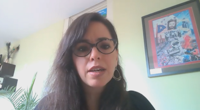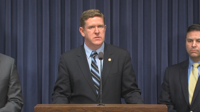SPRINGFIELD, Ill. �� Democratic lawmakers want to create an option for people to get a bachelor’s degree or certification in early childhood education while attending community college. Advocates say more than 28,000 Illinoisans could benefit from the .
Sen. Cristina Pacione-Zayas describes child care as the backbone of the economy. She said that became more evident for essential workers sending their kids to care centers throughout the COVID-19 pandemic. The Chicago native feels it’s time to empower the existing child care workforce to achieve their goals.
Pacione-Zayas says most child care workers are women from minority communities struggling to get by with low wages. In fact, she said many only make $10-$13 per hour. Pacione-Zayas also explained that most employees don’t receive good benefits and 46% are eligible for public assistance.
Her bill could allow the Higher Learning Commission to grant community colleges the ability to give students a Bachelor of Science degree in early childhood education. Community colleges could also confer a Professional Educator License with endorsements in early childhood education and early childhood special education.
“Individuals can be on a pathway to meet their educational goals as well as economic stability, and be able to support the nurturing development of young children,�� Pacione-Zayas said. “This is what we need to do because it’s an issue of not only racial equity, it’s gender equity and it’s economic equity.��
She also said Wednesday that her proposal could help solve the state’s vacancy problem in early childhood education. According to state data, roughly 2,200 classrooms are currently without appropriately qualified teachers to support child development.
Accessible degree pathways
Sen. Robert Peters (D-Chicago) says the Illinois early childhood education industry is diverse. However, he notes that diversity doesn’t carry over into all positions and settings. Peters said nearly 90% of positions for public pre-schools in Illinois require bachelor’s degrees or a teaching license. He stressed that those positions offer higher pay and more opportunities for growth.
“We need accessible degree pathways to ensure that educators of color are qualified and able to fill those higher paid roles and have mobility within the early childhood education field,�� Peters added.
Illinois Action for Children is also advocating for the bill to “lift up�� the early childhood education workforce. President April Janney says many are trying to care for children while balancing full-time work, family, and other responsibilities. She noted those are some of the main challenges preventing people from accessing traditional four-year programs.
“There’s 23 states allowing CCB [community college baccalaureate] degrees in a number of fields, including early childhood and education,�� Janney said. “This legislation is an opportunity to actually expand overall access of early childhood bachelor’s degrees statewide. We’re thrilled to be working with all of the committed partners to advance this type of creative and responsive policy proposal to help uplift the childhood workforce in the future.��
Held to the same standards
Advocates recognize that some people may find the process “watered down�� or feel students wouldn’t be held to the same standard. Juan Salgado, Chancellor of City Colleges of Chicago, says that’s far from the truth.
“Let me be very clear, the community college early childhood bachelor’s program would be held to the same standards of those four-year institutions. We’re governed by accrediting bodies that ensure that,�� Salgado said. “We meet the standards of those accrediting bodies. We have the capacity to do this with accountability and excellence.��
Pacione-Zayas explained this could also address a geographic issue for early childhood education. She said 85% of the 28,000 people who could benefit from the legislation work in 18 counties across the state. Pacione-Zayas stressed this is not just a Chicago or Cook County problem.
“This is a state issue and that’s why it requires a systemic solution, not just based on the good faith of one individual or one agreement between a four-year institution and a two-year institution,�� Pacione-Zayas said. “This is very much connected to how we come out of the pandemic and how we lift up an entire sector of the workforce who has shown up for us since day one.��
awaits discussion in the Senate Higher Education Committee.














